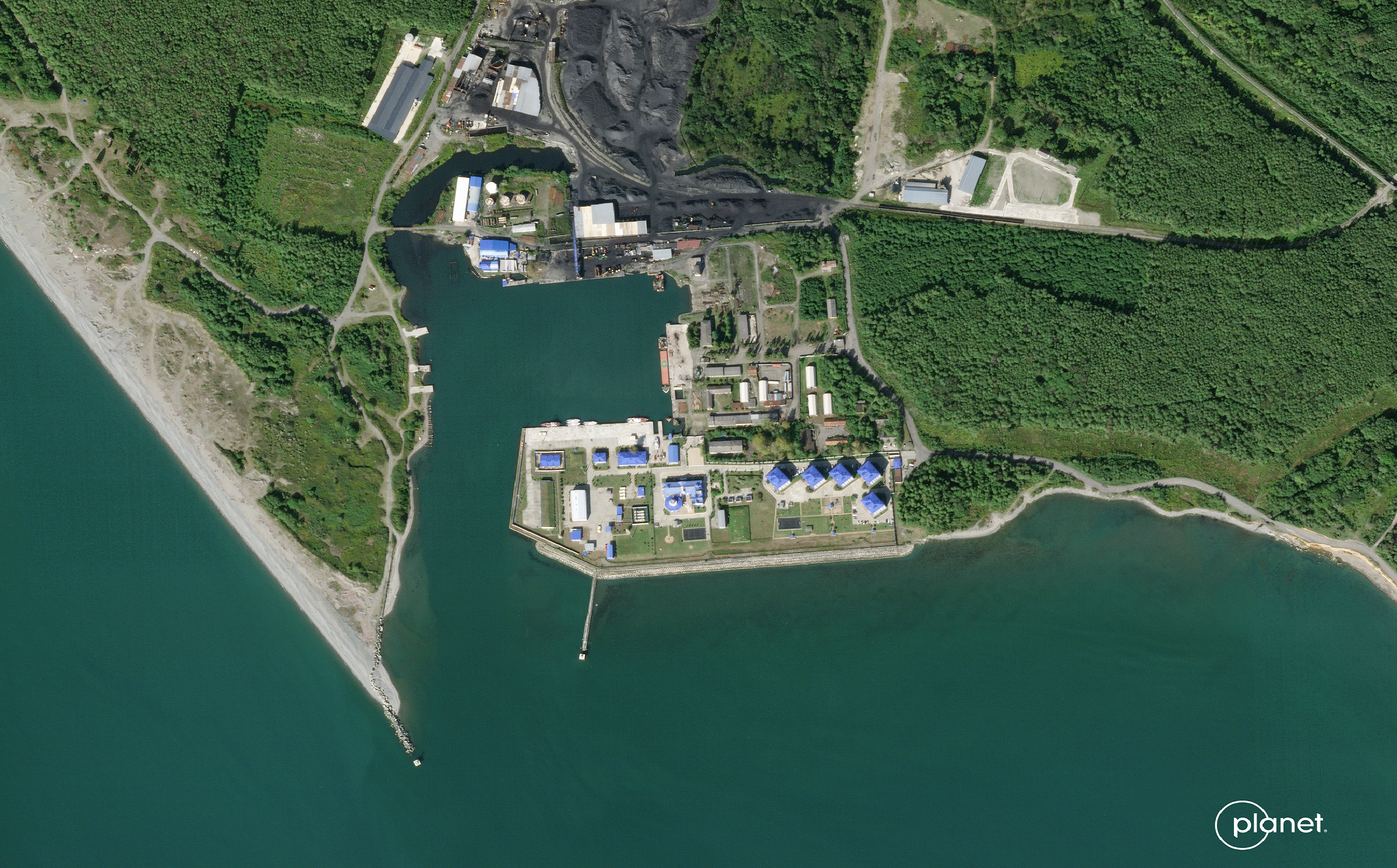Uncommon Knowledge
Newsweek is committed to challenging conventional wisdom and finding connections in the search for common ground.


New satellite images show fresh development at Russia’s newest Black Sea port—Ochamchire in the Kremlin-controlled Georgian breakaway region of Abkhazia—as Moscow seeks new hubs from which to project power into a sea that has become a key theater of its war on Ukraine.
Planet Labs PBC satellite images of different resolutions provided to Newsweek—the most recent available—indicate some construction and dredging at the Ochamchire port in the eastern Black Sea, which may be operational by the end of 2024.
The port is some 500 miles from the naval theater in which Ukraine has sunk or damaged multiple Russian vessels since February 2022. But thus far, the extent of the work appears inadequate for addressing Moscow’s Black Sea challenges, which have seen the bulk of the once-formidable Black Sea Fleet withdrawn from its primary bases on the occupied Crimean Peninsula.
“There are not many changes,” Andrii Ryzhenko, a retired Ukrainian naval captain and now a strategic expert at the defense and logistics consultant company Sonata, told Newsweek.
Ryzhenko identified new construction on land to the east of the bay and some additional small vessels moored on site, but little else of note in six months of satellite imagery.
Abkhazia’s pro-Moscow separatist administration has said that the dredging and other work planned at Ochamchire could see the port accommodate ships with a displacement volume of more than 14,300 tons; theoretically enough for all surviving Black Sea Fleet vessels to use it.
The port’s depth is believed to have previously been expanded to around 30 feet, according to 2022 data from the Rondeli Foundation. This means it can host larger military vessels, including frigates such as the Admiral Makarov, which became the Black Sea Fleet flagship after the April 2022 sinking of the Moskva.
Glen Howard—the former president of the Jamestown Foundation and an expert on Russian and Eurasian security—wrote on his Substack in 2023 that Ochamchire could ease congestion at the southern Russian port city of Novorossiysk by serving as an overflow base for corvettes and patrol ships.
“Moscow could still dispatch a group of corvettes from the Black Sea port to periodically strike Ukrainian territory using the long-range Kalibr missiles and then return to the safety of the naval base,” Howard wrote.
It is for this reason that Kyiv may well be making plans to strike Ochamchire. Ukraine’s Marichka submarine drone has a reported range of around 620 miles; enough to reach the Georgian coast.
For now, though, the port is being used by small FSB patrol ships and coast guard boats. As of 2022, the Rondeli Foundation said the port could accommodate up to 10 such Sobol– and Mongoose-class ships.
“This port is for the coastguard,” Pavel Luzin, a Russian military analyst and visiting scholar at the Fletcher School of Law and Diplomacy, told Newsweek.
Ochamchire cannot serve as an alternative to major ports in Crimea or elsewhere, Luzin said.
“This base is small enough and cannot be compared with Sevastopol and Novorossiysk,” he explained.
The Crimean port of Feodosia—from which Russia has also withdrawn warships in apparent fear of Ukrainian attack—would be a better comparison.
“Feodosia has never pretended to be an alternative to Sevastopol,” Luzin added.
Ryzhenko said Ochamchire could theoretically accommodate only around 5 percent of vessels from Sevastopol, and some 20 percent of those from Novorossiysk.
“It’s really very little,” he said. “I would not exaggerate the role of this base for the whole of the Black Sea Fleet. It would only be enough to moor one squadron of small-sized vessels.”

Newsweek has contacted the Russian Defense Ministry by email to request comment.
Russia has controlled the port since 2009, per its post-Georgia War agreement with the Abkhazia separatist authorities. The expansion of the port was agreed in the fall of 2023, as the Black Sea Fleet sustained repeated losses from Ukrainian drone and cruise missile attacks.
“This is all aimed at increasing the level of defense capability of both Russia and Abkhazia, and this kind of interaction will continue,” Aslan Bzhania—the leader of the puppet separatist state—said then of what he called a “permanent base of the Russian navy” at Ochamchire. “There are also things I can’t talk about,” he added.
Nikoloz Samkharadze, the head of Georgia’s Foreign Relations Committee, told the BBC in December that the proposed work at Ochamchire “will take them at least three years.”
Russian control over Abkhazia—and the other Georgian separatist state of South Ossetia—also offers Moscow lucrative economic opportunities via the so-called Middle Corridor; a trade route running from Southeast Asia and China to Europe.
Only Russia, Venezuela, Nicaragua, Nauru, and Syria recognize Abkhazia or South Ossetia as independent. In response to Russia’s port plans, Georgia’s Foreign Ministry last year expressed its concern over “the inclusion of the indivisible Abkhazia region of Georgia in the integration processes initiated by Russia.”
The ministry added that such actions “represent a gross violation of the sovereignty and territorial integrity of Georgia.”
Newsweek has contacted the Abkhazian Foreign Ministry by email to request comment.
Newsweek is committed to challenging conventional wisdom and finding connections in the search for common ground.
Newsweek is committed to challenging conventional wisdom and finding connections in the search for common ground.